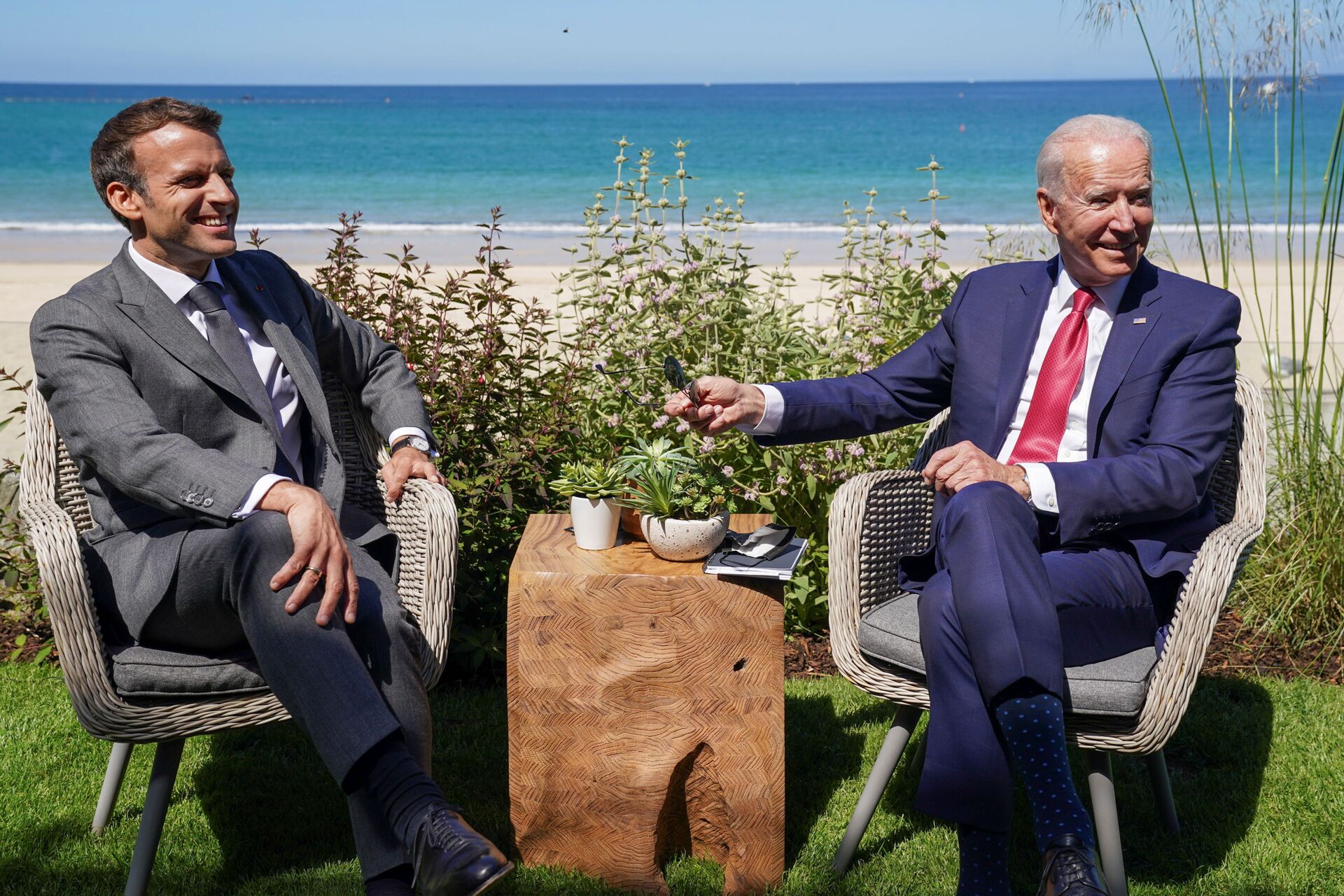https://sputnikglobe.com/20210918/revealed-how-washington-london-and-canberra-kept-paris-in-the-dark-about-aukus-deal--1089183642.html
Revealed: How Washington, London, and Canberra 'Kept Paris in the Dark' About AUKUS Deal
Revealed: How Washington, London, and Canberra 'Kept Paris in the Dark' About AUKUS Deal
Sputnik International
The announcement of a trilateral defence deal between the US, the UK, and Australia has sent shock waves around France, with Canberra's decision to acquire... 18.09.2021, Sputnik International
2021-09-18T11:03+0000
2021-09-18T11:03+0000
2023-05-28T15:15+0000
france
us
australia
submarines
aukus
aukus
united kingdom (uk)
https://cdn1.img.sputnikglobe.com/img/104707/48/1047074887_0:312:3000:2000_1920x0_80_0_0_e256faa6656d6338fbf785fa7fc6b791.jpg
The United States and Australia took extraordinary measures in order to "keep Paris in the dark" about their negotiations on the AUKUS deal to supply Canberra with nuclear-powered submarines designed by the US and the UK instead of the conventional vessels crafted by France, The New York Times has reported, citing people familiar with the matter.France, despite being one of America's oldest allies, was left uninformed about what was in the works until the last moment, with Australian officials waiting until as late as 30 August to reveal that the French Submarine programme was no longer of interest to them.AUKUS was announced earlier in the week, touted as a new security alliance between the United States, United Kingdom, and Australia that would boost regional security in the Asian-Pacific region, but viewed by many as something to counter China, even though this was never specifically mentioned in the deal. The fact that Australia will now acquire nuclear-powered submarines has prompted concerns not only in Beijing, but also in New Zealand, with Wellington swiftly stating it will ban nuclear submarines in its waters. However, the most bitter reaction followed from Paris, with French officials calling AUKUS a "stab in the back" and a "betrayal" by their old allies.Yet, according to The New York Times, these dramatic details made no impact on officials in the Biden administration when concealing the forthcoming AUKUS deal from the French, with POTUS purportedly reckoning that this was a situation when one strategic ally was more important than another.The Australians also never bothered to give France a heads up about their plans to cancel the submarine deal. What bothered them, according to the NYT, was the possibility of the conventionally-powered French submarines becoming obsolete before they even hit the water. In light of these concerns, the potential of substituting them with cutting-edge nuclear-powered vessels made by the US and the UK apparently seemed a lot more enticing - enough so to never enlighten France about their plans.The irony is striking, given that the allies met several times throughout the summer, including at the G7 summit in June hosted by UK PM Boris Johnson in Cornwall. At the time, Joe Biden and Emmanuel Macron, his French counterpart, were pictured during a "chummy chat" by the sea, smiling and shaking hands. Despite the friendly atmosphere, Biden never mentioned the AUKUS pact, the report noted. Three days later, Macron met Australian PM Scott Morrison - also to never be updated about the ditching of the French submarine programme.Per The New York Times, French officials were eventually informed by Biden's top aides about the AUKUS-related plans just hours before they were publicly announced.What Now?Dismayed, Paris recalled its ambassadors from both the United States and Australia. France's European Affairs Minister Clement Beaune later stated that he does not see how Paris can trust the Australians, given that it is currently in trade negotiations with Canberra, while other French officials dubbed AUKUS as a "betrayal" and a "stab in the back".Reacting to the the recall of the said ambassadors, both Washington and Canberra voiced their regret. Australia, however, offered nothing in its comments but hopes for "engaging with France again on our many issues of shared interest, based on shared values".The White House, for its part, said it was in consultations with its French partners, underlining that Paris is one of Washington's "oldest allies" and relations with France are highly valued in the United States.The AUKUS-caused debates appear to be far from over, as the trilateral pact was also slammed by Beijing, with China warning that such a defence alliance could undermine non-proliferation efforts and trigger an arms race.
https://sputnikglobe.com/20210918/the-last-time-the-us-gave-an-ally-nuclear-technology-france-tried-to-quit-nato-1089176433.html
france
australia
united kingdom (uk)
Sputnik International
feedback@sputniknews.com
+74956456601
MIA „Rossiya Segodnya“
2021
News
en_EN
Sputnik International
feedback@sputniknews.com
+74956456601
MIA „Rossiya Segodnya“
Sputnik International
feedback@sputniknews.com
+74956456601
MIA „Rossiya Segodnya“
france, us, australia, submarines, aukus, united kingdom (uk)
france, us, australia, submarines, aukus, united kingdom (uk)
Revealed: How Washington, London, and Canberra 'Kept Paris in the Dark' About AUKUS Deal
11:03 GMT 18.09.2021 (Updated: 15:15 GMT 28.05.2023) The announcement of a trilateral defence deal between the US, the UK, and Australia has sent shock waves around France, with Canberra's decision to acquire nuclear-powered submarines instead of French conventional vessels taking Paris by surprise. These plans prompted a dramatic withdrawal of the French ambassadors from both the UK and the US.
The United States and Australia took extraordinary measures in order to "keep Paris in the dark" about their negotiations on the AUKUS deal to supply Canberra with nuclear-powered submarines designed by the US and the UK instead of the conventional vessels crafted by France,
The New York Times has reported, citing people familiar with the matter.
France, despite being one of America's oldest allies, was left uninformed about what was in the works until the last moment, with Australian officials waiting until as late as 30 August to reveal that the French Submarine programme was no longer of interest to them.
AUKUS was announced earlier in the week, touted as a new security alliance between the United States, United Kingdom, and Australia that would boost regional security in the Asian-Pacific region, but viewed by many as something to counter China, even though this was never specifically mentioned in the deal.
The fact that Australia will now acquire nuclear-powered submarines has prompted concerns not only in Beijing, but also in New Zealand, with Wellington swiftly stating it will ban nuclear submarines in its waters. However,
the most bitter reaction followed from Paris, with French officials calling AUKUS a "stab in the back" and a "betrayal" by their old allies.
Yet, according to The New York Times, these dramatic details made no impact on officials in the Biden administration when concealing the forthcoming AUKUS deal from the French, with POTUS purportedly reckoning that this was a situation when one strategic ally was more important than another.
The Australians also never bothered to give France a heads up about their plans to cancel the submarine deal. What bothered them, according to the NYT, was the possibility of the conventionally-powered French submarines becoming obsolete before they even hit the water. In light of these concerns, the potential of substituting them with cutting-edge nuclear-powered vessels made by the US and the UK apparently seemed a lot more enticing - enough so to never enlighten France about their plans.
The irony is striking, given that the allies met several times throughout the summer, including at the G7 summit in June hosted by UK PM Boris Johnson in Cornwall. At the time, Joe Biden and Emmanuel Macron, his French counterpart, were pictured during a "chummy chat" by the sea, smiling and shaking hands. Despite the friendly atmosphere, Biden never mentioned the AUKUS pact, the report noted. Three days later, Macron met Australian PM Scott Morrison - also to never be updated about the ditching of the French submarine programme.
Per The New York Times, French officials were eventually informed by Biden's top aides about the AUKUS-related plans just hours before they were publicly announced.
Dismayed, Paris recalled its ambassadors from both the United States and Australia. France's European Affairs Minister Clement Beaune later stated that he does not see
how Paris can trust the Australians, given that it is currently in trade negotiations with Canberra, while other French officials dubbed AUKUS as a "betrayal" and a "stab in the back".
Reacting to the the recall of the said ambassadors, both Washington and Canberra voiced their regret. Australia, however, offered nothing in its comments but hopes for "engaging with France again on our many issues of shared interest, based on shared values".

18 September 2021, 01:39 GMT
The White House, for its part, said it was in consultations with its French partners, underlining that Paris is one of Washington's "oldest allies" and relations with France are highly valued in the United States.
"We understand their position and will continue to be engaged in the coming days to resolve our differences, as we have done at other points over the course of our long alliance", the statement by the US State Department on the matter said on Friday.
The AUKUS-caused debates appear to be far from over, as the trilateral pact was also slammed by Beijing, with China warning that such a defence alliance could undermine non-proliferation efforts and trigger an arms race.




